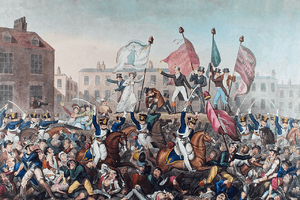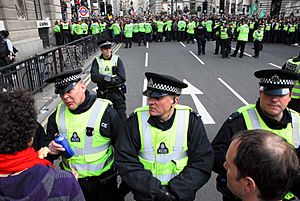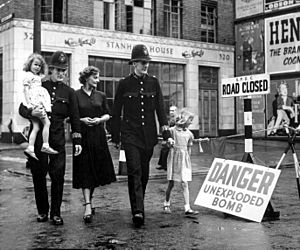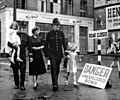Peelian principles facts for kids
The Peelian principles are ideas developed by Sir Robert Peel to create a fair and ethical police force. This way of policing is often called policing by consent in countries like the United Kingdom, Ireland, Canada, Australia, and New Zealand.
In this system, police officers are seen as regular citizens who wear uniforms. They use their powers to keep the peace because other citizens quietly agree to it. "Policing by consent" means that people trust the police because the police are open about their powers. They act with honesty and are held responsible for their actions.
Contents
How Policing Started

In the early 1800s, the British government tried to set up a police force for London. But many people were against it. They worried that a large, possibly armed police force could stop protests or support unpopular rulers. Britain had been at war with France, which had a strong police force. Many Britons did not want their police to be like France's. Most people also thought that local governments, not the national government, should control the police.
After the Napoleonic Wars ended in 1816, Britain faced tough times. Many soldiers came home and could not find jobs. Factories grew, but this also led to lots of unemployment. Laws like the Corn Laws made bread very expensive. Taxes on goods also went up. In 1817, the weather was bad, leading to poor harvests. This caused unrest, like the Pentrich rising, where three men were executed.
In 1819, the Peterloo Massacre happened in Manchester. About 60,000 people gathered to ask for the right to vote. Cavalry charged into the crowd, and at least eighteen people died. Other uprisings followed. Because of these problems, Sir Robert Peel believed that civil unrest was a big danger. This led him to develop the principles of policing.
Sir Robert Peel's Ideas
Creating the Police Force
In the early 1800s, London had almost one and a half million people. But only about 450 constables and 4,500 night watchmen policed the city. These groups were separate and unorganized. Robert Peel became the Home Secretary in 1822. He decided to create a professional police force.
Peel's Metropolitan Police Act 1829 set up a full-time, organized police force for London. This force was called the Metropolitan Police. The officers were often called 'Bobbies' after Sir Robert Peel. They are seen as the first modern police force.
The Main Principles of Policing
The Peelian principles describe how Sir Robert Peel thought a police force should work. These ideas were first written in the "General Instructions" for new police officers in 1829. Historians believe that Charles Rowan and Richard Mayne, the first police Commissioners, wrote these instructions.
Later, in 1948, Charles Reith summarized these ideas into nine key points. Here are the main ideas:
- Police should prevent crime and disorder. This is better than using military force or harsh punishments.
- The police's power depends on public approval. They need to earn and keep public respect.
- When the public cooperates willingly, the police need to use less force.
- Police should always be fair and independent. They should serve everyone equally, no matter their wealth or background.
- Police should use physical force only when necessary. They should use the least amount of force needed to do their job.
- Police are part of the public. They are citizens paid to do duties that all citizens share for the good of the community.
- The true measure of police success is the absence of crime and disorder. It is not how many arrests they make.
Public Trust
When police officers first appeared on London's streets, people wondered about their role. The government wanted to show that the police were not a military force. So, officers were not armed. Their uniforms also looked different from military uniforms.
At first, many people did not like the 'new' police. They were unsure what the police could and could not do. Over time, public opinion about the police improved. But even in the 1900s, some tensions remained.
Policing by Consent
Working with the Public
Historian Charles Reith explained that Peel's principles were unique. They created a police force that relied on public cooperation. This cooperation came from police behavior that earned public approval and respect.
The UK government explained "policing by consent" in 2012. It means the police's power comes from the public's general agreement. It does not come from the state's power. This does not mean individuals can choose to ignore the police or the law. Public trust in the police comes from their openness, honesty, and accountability.
A 2021 study described policing by consent in three ways:
- Police are "citizens in uniform."
- Police serve the public first, not the government.
- Using force is a last resort.
Global Impact
The ideas of policing by consent are still important today. They influence police forces in many Commonwealth countries, like Canada, Australia, and New Zealand. They also affect police in British territories.
The British policing model also influenced the United States. These principles helped shape the "community policing" movement in the 1960s. They are still part of police training today. Some police forces in countries like Finland and Norway also use a similar consent-based model.
Handling Public Gatherings

Because of policing by consent, the UK handles public gatherings and riots differently from some other countries. However, policing large events can still be challenging. For example, the death of Ian Tomlinson during the 2009 G-20 summit protests led to debates. People questioned the relationship between the police and the public.
During the COVID-19 pandemic, policing by consent remained important. Police in the UK and Ireland tried to enforce new laws while keeping public trust.
Police and Firearms
In the United Kingdom, police officers usually do not carry firearms. This is a long tradition. The UK is one of only 19 nations where police forces are routinely unarmed. These countries also have strict rules about gun ownership for citizens.
The increased use of tasers by police in the UK has caused some debate. Some worry it could harm the idea of policing by consent. One study noted that police being largely unarmed is a key part of this model. Terror attacks have led to more armed officers being deployed. However, studies show that people in the UK react more negatively when police are armed.
Training Police Officers
In Finland and Norway, police training focuses on a consent-based model. Recruits study at national colleges. They also spend time working with local police. They earn degrees in criminal justice or related fields. These countries also have strict rules about when police can use force.
See also
- History of law enforcement in the United Kingdom
- History of the Metropolitan Police Service
- Law enforcement in the United Kingdom
- Police and crime commissioner
- Preventive police
Images for kids
 | Aaron Henry |
 | T. R. M. Howard |
 | Jesse Jackson |





